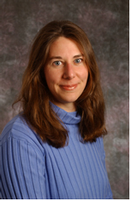Bloustein faculty members known for expertise on urban issues are giving their time and knowledge to community groups
Kathe Newman and Julia Sass Rubin are known for their deep understanding of urban communities and the challenges of maintaining stable neighborhoods, creating affordable housing, and attracting viable investment.
But the work of these two assistant professors at Rutgers' Edward J. Bloustein School of Planning and Public Policy extends far beyond the classroom, office, and library.
During the foreclosure crisis in New Jersey, Newman and Rubin have worked on the front lines, supplying their knowledge and technical skill to combat an epidemic that has displaced families and left neighborhoods in some of the state's poorest communities riddled with vacant, boarded-up buildings.
Rubin serves as chair of the board of New Jersey Community Capital, a Trenton-based nonprofit that works to stabilize vulnerable communities by financing affordable housing, charter schools, and other community projects. The organization recently stepped forward to provide the key financial backing for an innovative, community-based approach to stemming the tide of vacancies at the epicenter of the foreclosure crisis: the greater Newark area.
Newman, meanwhile, having enlisted a group of Rutgers students, worked extensively with the Newark/Essex County Foreclosure Task Force, assembling property histories in troubled neighborhoods and tracking down the hard-to-find statistics to document the crisis.
Both professors say their community-based work enhances their research and broadens their understanding of the issues they study. But they also say it's deeply satisfying to simply be involved in a hands-on effort to help communities solve complex problems.
“Economic justice and poverty alleviation are issues I really care about,” Rubin says.

Newman agrees, adding that the work provides critical learning experiences for students.
"I am able to teach, do research and perform a public service all at the same time," she says. "When you think about it, that's the essence of being a faculty member at a public university."
In Essex County – where foreclosure filings doubled between 2004 and 2008 – Newman and a group of Bloustein students were literally on the streets, researching property histories in the hardest-hit neighborhoods. They also obtained critical data from government agencies, financial institutions, and courts that helped document the extent of foreclosures.
"There were just all these bits of pieces of how bad the situation but there was nobody to pull that together," Newman said. "We started pulling the data so we could say 'here is how things looked, based on what we know.'''
The work was a big help to the foreclosure task force, which formed in 2007 to devise a strategic, local response to the problem.
"Kathe is a community-driven academic," says Stephanie Greenwood, a principal planner with Newark and taskforce coordinator. "She was able to help us understand the landscape of the problem: where the foreclosures are occurring, what types of properties are involved, and who is affected."

The project, known as Operation Neighborhood Recovery, will now be expanded into a statewide model, with New Jersey Community Capital leading the way. Rubin says it's a particularly effective approach because it involves acquiring properties early in the foreclosure process, securing financial partnerships and enlisting local community organizations to handle redevelopment and title issues.
"Operation Neighborhood Recovery is based on a solid understanding of individual streets and of which properties can stabilize neighborhoods," says Rubin.
Wayne Meyer, who developed the program for HANDS and now serves as the president of New Jersey Community Capitol, said Rubin showed vision and courage in supporting what is essentially a new, collaborative approach.
"The traditional models, where cities have given properties to non-profits to develop into affordable housing, are completely outdated," Meyer says. "In order to stay relevant we needed to try to figure out new ways. Julia saw what we were doing with Operation Neighborhood Recovery and advocated for that approach. Now she is helping bring it to an even larger scale."